- Home
- Brandon Sanderson
Dawnshard Page 4
Dawnshard Read online
Page 4
Talik nodded.
“I was one of the ones that told them to send to you,” Lopen said. “See, lots of us people—Herdaz, Reshi, even Thaylenah to an extent—are small. But the whole world has been invaded, not only the big places. And a lot of small people make big numbers, velo. That’s why I wanted to talk to you first, to ask you to listen to what the Alethi say.”
“I will suggest to the king that he accept your advice, the Lopen,” Talik said, then extended his hand. “I appreciate your sincerity. It is not what I expected to find in this city.”
Lopen took the hand.
“Before you take me down,” Talik said, “I have a . . . somewhat delicate question for you. Our king, who is one of my parents, has undergone some unusual physical changes lately. They have transformed him in dramatic ways, and at first we thought it was a gift of our god, as he was not born looking as he does now. We now realize this transformation is in relation to a spren he has been seeing. It is why he agreed to make this long trip.”
“Your king is Radiant!” Lopen said. “What kind?”
“He can make the very air seem to catch flame,” Talik said. “And sees a spren that burns through the inside of objects in curious treelike patterns.”
“Dustbringer,” Lopen said. “We’ve been hoping to find some more. Look, this is great. But don’t talk to the ones we already have, all right? It’s complicated, but we’d love to see you figure your own way, without anyone interfering.”
“I do not understand.”
“I don’t really either,” Lopen said. “Have your king talk to Dalinar about it, all right? But don’t tell anyone else. It’s politics. The annoying kind.”
“There’s another kind?”
Lopen grinned. “I like you, velo.” He grabbed Talik by the arm and flew him to the floor—where a number of his friends were arguing loudly with some of Dalinar’s soldiers. They were all surrounded by pools of angerspren and gesturing at the sky. Poor guys. Probably sad they didn’t get to fly too.
Kaladin had arrived, so Lopen towed Talik over and presented him. “This is my cousin Talik,” Lopen said, pointing. “He’s, sure, the king’s son. Treat him well, gancho.”
“I’ll try,” Kaladin said, his voice dry. “I hope Lopen’s tour of the tower was informative.”
“Tour . . . ?” Talik said, glancing at Lopen, who made some low-key shushing gestures. Wasn’t Lopen’s fault he’d spent too long at lunch and hadn’t managed to greet the Reshi when they arrived. He blamed Cord’s cooking. “Yes . . .” Talik continued. “It was informative.”
“Excellent,” Kaladin said. “I have scheduled a meeting for your king with Dalinar and Navani Kholin, rulers of this tower. Though perhaps we should first deal with whatever is happening over there. . . .” He pointed at the Reshi king’s arguing soldiers. Talik rushed over to calm them, though Kaladin lingered with Lopen.
“Where is Huio?” Kaladin asked.
“He was busy. So I went on my own.”
Kaladin gave him a long-suffering look. Huio and Lopen had persuaded him that the Reshi would respond best to Herdazians meeting them, and that was true. So why was he having a problem?
“I had counted,” Kaladin said, “on Huio reining you in a little, Lopen. You didn’t do anything stupid, did you? You did ask before you flew him up high, right?”
“Um . . .”
“Lopen,” Kaladin said softly. “You need to start thinking more about what you do and say. Please. Be more careful.”
“I will,” Lopen promised quickly. “Look, everything turned out all right, gancho! That Talik fellow, he’s a good one. Take care of him. These Reshi have a secret you’ll find interesting, and they might tell you, if you’re nice.”
“What? Why don’t you tell me?”
“Can’t, gancho,” Lopen said. “They told me in confidence.”
“Lopen,” Kaladin said with another of his long-suffering captain-of-the-world sighs. “You were sent specifically to do reconnaissance on this group.”
“Sure, and I did. But I can’t betray their secrets. They’re my cousins, gon.”
“They’re not your cousins.”
“Herdaz is next to Reshi. So we’re cousins.”
“Alethkar is next to Herdaz too,” Kaladin said. “So I’m as much your cousin as those people are.”
Lopen tapped him on the shoulder and winked. “You’re finally figuring it out, gancho. Good job.”
“Well, I suppose that’s beside the point. I want to ask you something. The queen needs me to send some Windrunners on a mission to—”
“Oh!” Lopen said. “Pick me. I wanna do it.”
“You don’t even know what the mission is, Lopen.”
“Still volunteering,” Lopen said. “Sounds special.”
“We’re sending another mission to Akinah.”
“The place where Leyten got dropped into the ocean?” Lyn and Sigzil had barely managed to rescue him after something sucked away his Stormlight.
“Same,” Kaladin said. “We don’t have a lot of resources to spare at the moment, but Navani is convinced something important is hiding on that island. So we’re sending a scouting mission via ship. I suggested we send Windrunners who could swim, just in case. That means you and Huio.”
“Pick me!”
“I literally just did.”
“I know. That was for old time’s sake.”
“Navani’s sending a scribe,” Kaladin continued, “and you should listen to her advice. Also, I was thinking it might be good to send Rock. He’s one of the only other members of Bridge Four who can swim, and Leyten’s report included seeing strange spren in the clouds. They might be involved with whatever is leeching Stormlight. It would be nice to have him along to see Voidspren, if they try to remain hidden.”
“Rock won’t go,” Lopen said. “Next week’s his anniversary with his wife. We can take Cord. She can see spren too, and she wants to see more of the world. Besides, Rua likes her.”
Kaladin glanced toward the honorspren, who was bouncing along the ground in the shape of a full-sized axehound. “Lopen. I’m worried about this mission. Something about it doesn’t feel right. I’d go myself, but . . .”
Lopen understood. Kaladin already had to divide his time between the battlefronts in southern Alethkar and Azir. Plus he had to organize patrols to watch the coalition fleets from above, and see to training here in the tower. The numbers of Windrunners were swelling, now that so many of the original crew were picking up their own squires.
It was a lot for one man to track. They were long past the point where Kaladin could go with every team to watch them personally. It seemed to be tearing him apart inside to let go.
“Hey, gancho,” Lopen said, his hand on Kaladin’s shoulder. “I’ll make sure everyone comes back, all right? Don’t you worry.”
“Make sure you come back too,” Kaladin said. “Go talk to Huio and Cord and see if they’re willing. Then report to Rushu, the ardent you’ll be accompanying. She has information on some secret details of your mission that I don’t want to discuss in public. After that, have your team travel to Thaylen City via Oathgate and report to the docks tomorrow morning. And be careful.”
“Gancho, I’m always careful.”
“Are you?”
“Of course,” he said, pointing at himself. “What? You think this happens by accident?” He grinned, waved Rua over, then went to taunt Huio about being sent on a special mission—before relenting and telling him that he got to go too.
4
Rysn had been warned never to mistake Thaylen naval traditions for Thaylen naval regulations. Regulations, after all, were written down—which made them far, far easier to change. She considered this as Nikli and his assistant brought her aboard the Wandersail. Her ship. And not her ship. Both at the same time.
It was an incredible craft. Full-rigged, built for speed from light—but strong—Soulcast wood. It had ballistae with attached firepods for setting aflame enemy ships,
and could drop sails quickly and maneuver with oars if faced by the same. It was fearsome in war, swift in trade. And a part of Rysn still couldn’t believe she owned it.
And she did. Rysn was its master, though ownership of Thaylen merchant ships could be complex. Vstim, her teacher and friend, had ordered the ship built, but had accepted investment funds from several others. Since he was now Minister of Trade, he’d given the ship to her—transferring ownership while remaining the primary investor.
A large part of its profits would go to the investors, including Vstim or his heirs—but he had given her the writ of ownership, and the symbolic captain’s cord to hang with her colors. That was the strictest definition of ownership, and no one would dispute it.
And yet, she had never touched the ship’s wheel. She wasn’t so innocent as to assume that she’d be able to helm the ship herself, but Vstim—when they’d been on voyages together—had usually been offered the chance to steer the ship for a short time near the start of the voyage. A symbolic ritual, but one he had always seemed to enjoy.
Rysn had asked for the same privilege on her first voyage last month. She hadn’t realized that her babsk had earned this privilege over years of caring for the crews of his ships. The captain had explained the distinction clearly to Rysn, in the same breath that she’d forbidden Rysn from ever asking again.
Rysn could order the ship to a destination, but she could not steer it. It was a distinction she’d never understood. And it meant that despite what the papers said, the ship was not Rysn’s. She owned it. She commanded it. But at least according to maritime tradition, it was not hers.
Tradition. Stronger than Soulcast wood. If only they could find a way to build ships directly out of it, they’d fear no wind or wave.
The captain, Drlwan, was a short woman with a sharp nose and unusually blonde hair. Rysn hadn’t realized until recently that having female officers was odd in other navies. In the Thaylen navy, while the bulk of sailors were men—trained to work the ballistae and repel boarders—female captains were common. Plus both the quartermaster and the navigator were women by tradition.
On the Wandersail, the soldiers were led by Kstled, the ship’s man-at-arms, who was the captain’s brother. Both captain and man-at-arms bowed formally to Rysn as she was carried up to the quarterdeck. Nikli and his assistant carried her in her wheeled chair to her new station: a tall seat, bolted to the deck, with a sunshade. It was out of the way of the helm, but would give her an excellent view of both the main deck and the surrounding ocean.
“Any thoughts?” she asked Nikli.
“It looks great, Brightness,” he said, rubbing his chin. “You might want a table at the side—or better, something with a flat top and drawers you can latch shut.”
“That’s a good idea,” she said.
“We can move one of your nightstands from the cabin, if you want,” he said. “Would only require some basic carpentry. We’ll try not to bother you too much setting it up.”
She nodded in thanks, then had him move her from the wheeled chair—which had a place to strap it down nearby—to the new station. This had a belt to hold her in place. The extra support would be welcome on the rolling ocean waves. The chair also had, by her request, some leg straps she could fasten to keep her legs in place during rough seas, though she didn’t intend to use those during ordinary sailing.
Nikli stowed her chair as she did up the belt. The burly porter didn’t say anything, but eyed the captain as she stepped over. He obviously didn’t like the way Rysn was treated on board, though he hadn’t said anything on the matter.
“Rebsk,” the captain said, calling Rysn by her formal title. It meant “shipmaster” or “owner.” “I formally welcome you on board.”
“Thank you,” Rysn said.
“I would like to suggest, now, that you remain at port,” Drlwan said. “You are not needed on this mission.”
Rysn felt an immediate burst of frustration. “Why would you think that, Captain?”
“Your job is to handle trade negotiations,” Drlwan said. “This voyage will include no such need. It is a survey mission. It could be dangerous, and as such, it would be wise if you remained safe at port. We can relay our experiences to you via spanreed.”
“Your concern for my well-being is commendable,” Rysn said, controlling her voice with effort. “But I have been tasked with this mission, and I will see it through.”
“Very well,” the captain said. She left to return to her post; by tradition she needed no dismissal from Rysn. And she never waited for one.
Nikli stepped over, handing her Chiri-Chiri, who was dozing. “I don’t think the captain cares a wink for your safety, Brightness,” he said softly. “She simply doesn’t like you.”
“I agree,” Rysn said, idly scratching Chiri-Chiri under the neck as she watched the captain chat with the man-at-arms.
“Do you think it’s because of . . . the way you are?”
“Possibly,” Rysn said. “But usually others are uncomfortable—or condescending—around people like me, not outright hostile. Not everything in people’s interactions with me is related to my condition.”
So what was the reason so many of the crew resented her? She wasn’t certain she could stand another full trip constantly feeling their eyes on her.
“I hesitate to mention this,” Nikli said, “but perhaps it would be better to delay the trip and look for another crew. That would give us more time to install the table for you, also.”
Rysn shook her head. “I need to learn to work with this crew. They are made up of my babsk’s most trusted and accomplished sailors. Plus, they trained on this ship. They were sailing it on test runs before it was formally commissioned.”
Nikli nodded and withdrew to stand near the steps, waiting for her commands. Rysn continued scratching Chiri-Chiri, lost in thought. Below, Queen Navani’s team arrived: two Windrunners, an ardent scribe, and a young Horneater woman—perhaps in her late teens or early twenties—who Rysn thought must be their servant. The sailors hailed them, and a few cheered.
“An odd reaction,” Rysn mumbled. Though she’d made her seat high, the railing to midship still obscured some of her view. An unfortunately common experience for her. “I would not have expected cheering.”
“It’s always good to have a Windrunner or two nearby, Rebsk,” the man-at-arms said, walking past. “I’d never turn down passage to one of them.”
This war had proven how vulnerable ships were to enemies who could fly. Large stones—dropped from very high—could sink even the strongest of ships. But that reaction, the excitement from the crew . . . was it covering something? Rysn had been trained to watch for overexcitement in a trade deal. Sometimes a person would try too hard to sell a product or idea. The way the sailors acted reminded her of that.
“Captain?” Rysn said, calling over Drlwan again. “What has happened? Why are the sailors on edge?”
“It’s . . . nothing, Rebsk,” the captain said.
Rysn narrowed her eyes. Though she hadn’t thought it remarkable at first—as the captain could be a showy woman—Drlwan was outfitted today in her formal dress uniform. Stark white, glistening with medals. She also wore an intimidating tricorn hat, her eyebrows curled and dangling beneath it. Although she had retired from official military service, the navy and the merchant marine were really two sides to the same card; ranks and accolades were shared between the two.
Today, that uniform was a show of force. A symbol.
“Tell me anyway,” Rysn said.
Drlwan sighed. “Ship’s pet was found dead this morning.”
The ship’s pet was a skyeel, good for hunting rats. Rysn knew from her previous voyage that a lot of the crew had liked her.
“Bad omen,” Kstled muttered from behind.
That caused Drlwan to glare at him. Modern Thaylens weren’t as superstitious as their ancestors—or at least they weren’t supposed to be. They were good Vorins these days. And the coming of the Voidbri
ngers—whose ways and worship seemed uncomfortably close to the Passions and Thaylen pageantry—hadn’t done the old religions any favors. Rysn herself had drifted away from such ways of thinking, trying to be more intentional about her beliefs.
At any rate, Thaylens formally ignored omens. It was on the books, you might say, that such things were nonsense. Yet tradition was powerful, and when out at sea, logicspren could seem distant things indeed.
“Having a Windrunner on board,” Rysn said. “Good omen?”
Kstled nodded, eyebrows sleek and tucked behind his ears. “You could call it a . . . replacement for the dead skyeel. A counter-omen to the one this morning.”
“It’s all nonsense,” the captain said. “I have told the crew many times that I won’t stand for this kind of talk.”
“Indeed, you are wise,” Rysn said. “Tell me, have the crew been informed of our destination?”
“They have.”
“And did any express concern?”
The captain sniffed. “They were instructed, prior to the briefing, that there would be no questioning or grumbling. Queen Fen herself sent a writ supporting this mission. So we are committed.”
“I see,” Rysn said. “Spread my will among the crew. Tell them that if any have misgivings about our destination, they may remain behind—with no punishment—and join us again when we return.”
Drlwan drew her lips to a line. She didn’t like it when Rysn gave orders about the crew, though it was within Rysn’s rights. “Very well, Rebsk,” Drlwan said, nodding to her brother. He bowed to Rysn and ran off to pass the word.
“This could delay the mission,” the captain noted.
“Then so be it,” Rysn said. “I know that the crew still feels uncertain about following me, considering my lack of experience.”
“You were hand-picked by Vstim and given this ship as a mark of his favor. No sailor would speak out against you.”
And that isn’t exactly a contradiction of what I said, now is it, Captain?
In that moment, a thought occurred to her. She’d been seeing this entire experience—Vstim giving her the ship, her elevation to rebsk—through her own eyes. But she had been taught to look at interactions in a different way. What did the captain want? Why was she dissatisfied?

 Steelheart
Steelheart The Rithmatist
The Rithmatist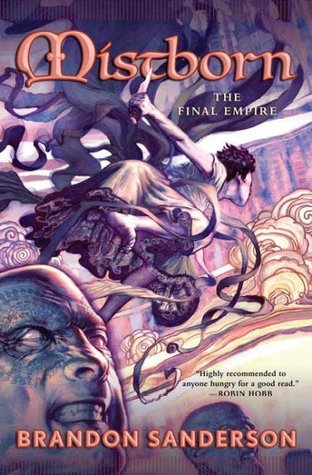 Mistborn: The Final Empire
Mistborn: The Final Empire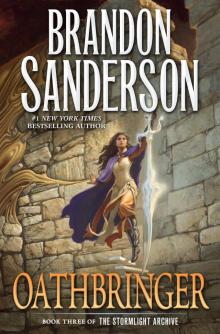 Oathbringer
Oathbringer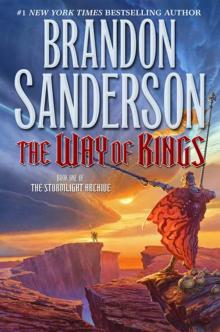 The Way of Kings
The Way of Kings Redemption
Redemption Skin Deep
Skin Deep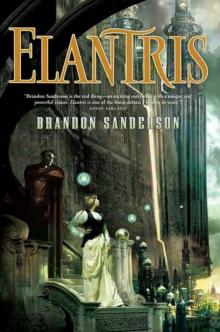 Elantris
Elantris Snapshot
Snapshot Sixth of the Dusk (Cosmere)
Sixth of the Dusk (Cosmere)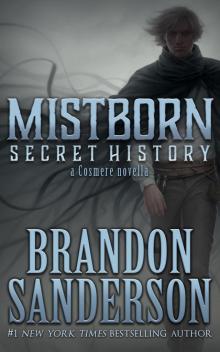 Mistborn: Secret History
Mistborn: Secret History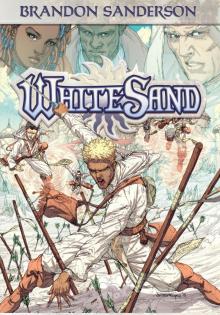 White Sand, Volume 1
White Sand, Volume 1 Legion
Legion The Well of Ascension
The Well of Ascension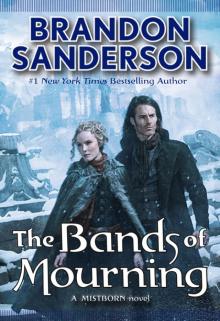 The Bands of Mourning
The Bands of Mourning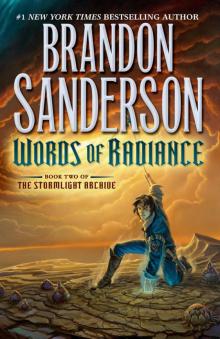 Words of Radiance
Words of Radiance The Hero of Ages
The Hero of Ages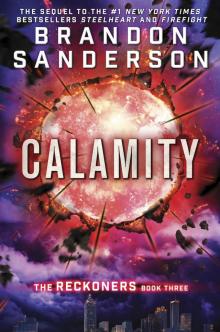 Calamity
Calamity Alcatraz Versus the Scrivener's Bones
Alcatraz Versus the Scrivener's Bones The Alloy of Law
The Alloy of Law The Emperors Soul
The Emperors Soul The Dark Talent
The Dark Talent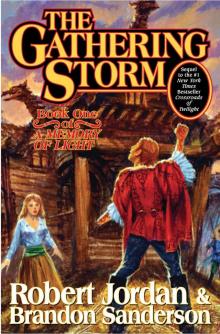 The Gathering Storm
The Gathering Storm Alcatraz Versus the Shattered Lens
Alcatraz Versus the Shattered Lens Mitosis
Mitosis Alcatraz vs. The Evil Librarians
Alcatraz vs. The Evil Librarians Rhythm of War (9781429952040)
Rhythm of War (9781429952040)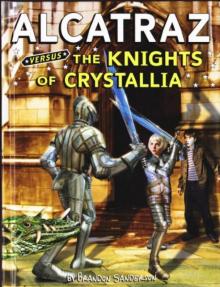 Alcatraz Versus the Knights of Crystallia
Alcatraz Versus the Knights of Crystallia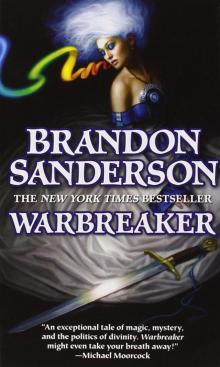 Warbreaker
Warbreaker Firstborn
Firstborn Starsight
Starsight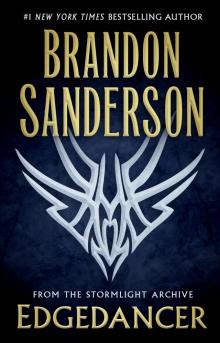 Edgedancer
Edgedancer Perfect State
Perfect State Shadows of Self
Shadows of Self The Way of Kings Prime
The Way of Kings Prime Starsight (US)
Starsight (US) Shadows for Silence in the Forests of Hell
Shadows for Silence in the Forests of Hell Arcanum Unbounded: The Cosmere Collection
Arcanum Unbounded: The Cosmere Collection Awakening
Awakening Firefight
Firefight Dawnshard
Dawnshard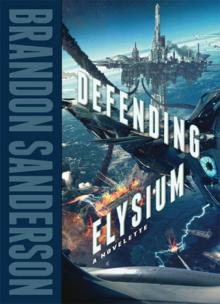 Defending Elysium
Defending Elysium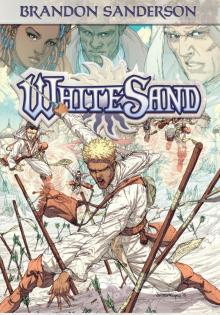 White Sand
White Sand Infinity Blade: Redemption
Infinity Blade: Redemption The Final Empire
The Final Empire Skyward
Skyward Lies of the Beholder
Lies of the Beholder Elantris e-1
Elantris e-1 Steelheart r-1
Steelheart r-1 Legion: Skin Deep
Legion: Skin Deep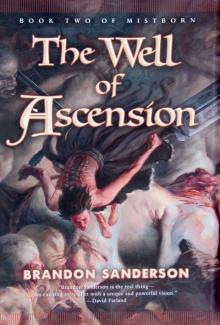 Well of Ascension
Well of Ascension Mistborn
Mistborn Alcatraz versus the Evil Librarians
Alcatraz versus the Evil Librarians The Final Empire m-1
The Final Empire m-1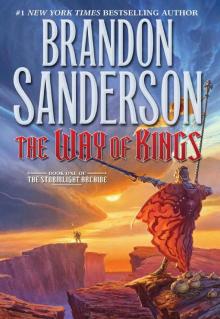 The Way of Kings (Stormlight Archive, The)
The Way of Kings (Stormlight Archive, The)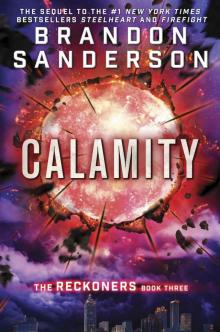 Calamity (The Reckoners)
Calamity (The Reckoners) Legion and the Emperor's Soul
Legion and the Emperor's Soul Legion: The Many Lives of Stephen Leeds
Legion: The Many Lives of Stephen Leeds The Mistborn Trilogy
The Mistborn Trilogy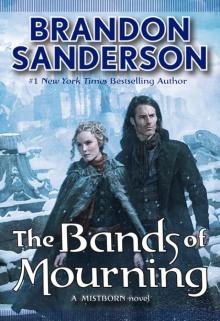 Bands of Mourning
Bands of Mourning Alcatraz
Alcatraz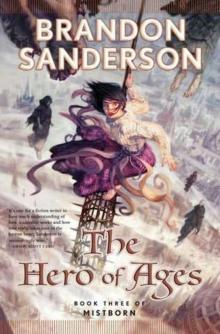 The Hero of Ages m-3
The Hero of Ages m-3 Alcatraz vs. the Shattered Lens
Alcatraz vs. the Shattered Lens The Alloy of Law: A Mistborn Novel
The Alloy of Law: A Mistborn Novel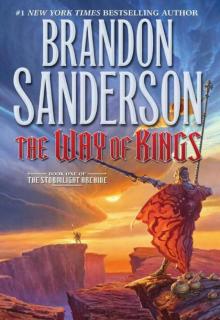 The Way of Kings sa-1
The Way of Kings sa-1 Infinity Blade: Awakening
Infinity Blade: Awakening Sixth of the Dusk
Sixth of the Dusk The Stormlight Archive
The Stormlight Archive The Aether of Night
The Aether of Night